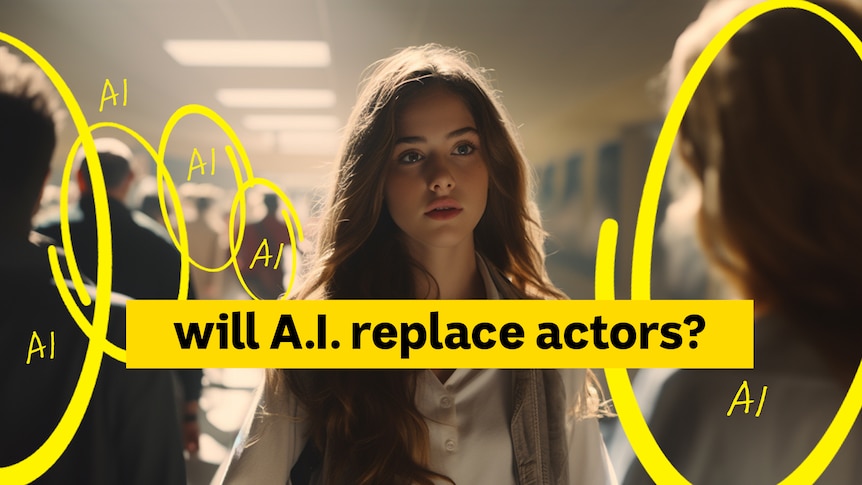Nat Kelly, BTN Reporter: Hollywood actors have been on strike. Calling for things like better pay, better work conditions and protection against the use of AI. The Writers Guild Of America has been on strike even longer, saying they deserve better residuals, which are like royalties, as well as fighting against the use of AI to replace real writers. It's the first time since the 1960s that both actors and writers have been on strike at once and with both unions refusing to work, it's brought a lot of movies and TV shows to a grinding halt.
But one aspect of the film and TV world that's often overlooked is the role of background actors. They're the people you see in cafes, offices, on the street who don't have speaking roles. You're not supposed to pay attention to them… but they play an important role in making a scene feel more realistic.
But now they're worried about a proposal put forward by the Producer's Alliance or AMPTP, which wants to take digital scans of real actors and turn them into AI versions of themselves to do the acting instead.
Esther Cunningham, Actor: So I'm an actor and I worked a lot before the strike as a background actor, which is the extras who are going in and out of the scenes on film and TV.
This is Esther. She's part of the Screen Actors Guild and she's been on strike since July.
Esther: The original AMPTP offer was to pay a background actor half a day's work to scan their body image, and then own that image and likeness in their corporation forever. So they would be paying me 95 dollars. I don't know what that is an Australian money but $95 to own my body and likeness permanently, which is a very low rate, in my opinion, for what I think my body is worth a little bit more than that.
The AMPTP says that the digital replicas of actors would only be used in productions the actors had initially signed up for and that any future uses would need the actor's consent.
But for actors like Esther the problem isn't just a monetary one.
Esther: So that's a huge part of it, because it's about the respect of my physical being, my physical form, and also a respect of what background actors bring to a set and that we're not just set pieces that move around… like sure, great actors can imagine a lot of things but seeing that other person is what may makes great art, that connection between your actors is what really brings things to life. And so filling in the world of a show allows those principal actors to bring their performances to life better I think, as opposed to them just being in a green screen.
The film that holds the record for the most amount of background actors is the 1982 film, Gandhi. In this scene there is a whopping 300-thousand actors. And in the 40 plus years since, it's a record that has remained unbroken.
In recent times big TV shows like Ted Lasso have had to get creative with their crowd scenes. They filmed during the height of the COVID-19 pandemic so filling a stadium with real actors was not an option. Instead, a digital effects team was tasked with the job of making it look real using a mixture of real humans filmed against a greenscreen and digital, computer generated ones made from scanning real actors.
Esther: So obviously that's already happening, budget restraints, practicality, there's going to need to be some use of that. But I think that we are at a huge crossroads and understanding the importance of an artist and what everyone onset brings to the creation of the final project and until the companies understand that and respect that, I don't think that there's a way forward.
The Actors Guild and the AMPTP have had lots of discussions to try and hash out a deal. The writer's guild has been able to make a deal with the producer's alliance, which many see as a promising start.
With some studios already reporting losses of hundred of millions of dollars as a result of the strike and actors having to get help from the government while they're not able to make an income, it makes sense that everyone wants to get back to making films and TV shows as soon as possible.
Esther: like not to be overdramatic. But it all feels a little existential, my peers who are background actors, because this has been our way of making money and our way of being in the film industry. A lot of the way people view actors is they view the Margot Robbie's the, the big stars, the headliners of the billion dollar movies and they don't think about the people who are doing like one line and paying rent from that one line and the residuals they get from it. And so sort of feeling this need to say, hey, you might not have seen us on a red carpet but we're here and we matter and we're part of this industry and part of what tells these stories and I think having a union behind us that supports us and fights for us is really important.
